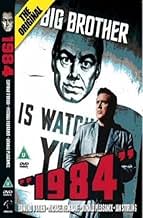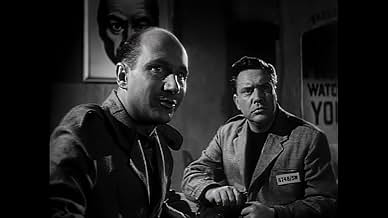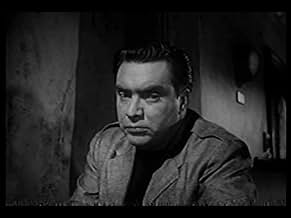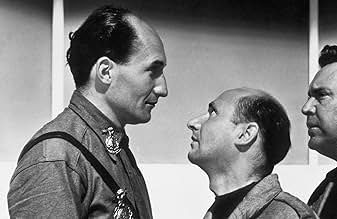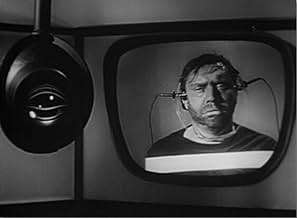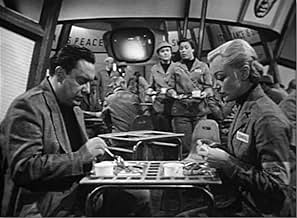IMDb RATING
6.9/10
4.6K
YOUR RATING
In a totalitarian future society, Winston Smith, whose daily work is re-writing history, tries to rebel by falling in love.In a totalitarian future society, Winston Smith, whose daily work is re-writing history, tries to rebel by falling in love.In a totalitarian future society, Winston Smith, whose daily work is re-writing history, tries to rebel by falling in love.
- Director
- Writers
- Stars
Donald Pleasence
- R. Parsons
- (as Donald Pleasance)
Kenneth Griffith
- Prisoner
- (as Kenneth Griffiths)
Barbara Cavan
- Woman
- (voice)
- (uncredited)
Walter Gotell
- Guard
- (uncredited)
Anthony Jacobs
- Telescreen
- (voice)
- (uncredited)
Barbara Keogh
- Special Woman
- (uncredited)
Bernard Rebel
- Kalador
- (uncredited)
- Director
- Writers
- All cast & crew
- Production, box office & more at IMDbPro
Featured reviews
10bux
Dingy, atmospheric version of George Orwells tale concerning two citizens of the New World Order involved in illicit, illegal love. Nothing is pretty in this story, and perhaps O'Brian and Sterling are a bit long in the tooth for the characters the author had in mind, however the superb dramatizations overcome any casting mishaps. The story of life in a totalitarian society rings chillingly familiar today. And, in the conclusion, to quote the poet laureate of our times, Todd Rundgren "Winston Smith Takes it on the Jaw Again!"
The destruction of love is what we see here effectivly in all aspects of society.
the destruction of the family , an enemy that is artificial , control of the history .
It is scary and maybe far more nearby to us now than ever before because some aspects are now pretty actual in this so called crisis , like fear for eachother and isolation from another .
......is even better. One might be tempted to call this a remake, and I suppose it is, but it was the first theatrical rendition, enabling audiences to watch Big Brother (watching them) on a bigger screen than was possible via the BBC/Peter Cushing version (1954) of two years earlier. I agree with previous commentator "bux's" observance that, while Edmond O'Brien and Jan Sterling may not have been Orwell's first casting choices for Winston and Julia for the reason stated, the sterling performances generated by the leads and their supporting cast more than compensate. As a huge fan of the late, great Hammer Films luminary Michael Ripper, I was especially pleased to see him helping to take up the rear as an Outer Party Orator, exemplifying the tender loving care with which producer N. Peter Rathvon saw fit to cast even the smaller roles.
I finally was able to see this film, having seen the 1984 version with John Hurt when I was in college. I recall the 1984 version having some good production values, but I remember being disappointed also. This version was well-cast, and the art direction was also competent. Edmund O'Brien turned in a great performance as Winston Smith. I think that he brought a great quality of desperation to the role; which seemed to run contrary to John Hurt's performance. I'm sure there was a lot left out of the book. But I get tired of hearing people moan and groan about the argument of literature vs. cinema. Come on people, film is time-based, and can't digress like novels can. The screenwriter/director mainly extracts plot points, and can't be bothered with too much exposition (unless of course they have a whopping budget!). I've read many criticisms where more skeptical viewers complain that we don't get to know Big Brother's motives, strategy, etc... What?!! It's Big Brother - an enigmatic and probably non-existent despot....you're not supposed to know his whole story! The love affair, although brief, is very empathetic. In lieu of all the paranoia, Big Brother-cheerleading, etc. - the love between Winston and Julia is a good emotional oasis. Even though I watched a poor copy of this version, it really did make an impression. One of the few criticisms I have is Room 101. I thought the rat shot/scene was truncated, and could've been dramatized more. That's where the John Hurt version trumps this one.
This is a relatively faithful rendering of one of the novels that I remember from my youth. All the high school kids (who read anything) were reading it and talking about it. This was in the early sixties. I could not put the book down as terrifying and depressing as it was. All elements of society were controlled by the leaders. It brings to mind modern North Korea where the citizens are clueless and fed jingoistic nonsense. Winston Smith is a worker who has an intellectual side. He begins, through connections with others, to see that there is something wrong with the way he and his fellows are treated. Everything is controlled. He is ill and every day is like the last. Big Brother is looking out for everyone. He's probably not a real person, but they don't know. Winston meets Julia and they start to have a relationship. We know where this is going. As bad as things are, the producers don't get into some of the even more oppressive business of the government. Not a story for the squeamish.
Did you know
- TriviaSonia Orwell, widow of George Orwell, objected to the changed ending, and had this movie withdrawn from circulation.
- Quotes
O'Connor of the Inner Party: You will be hollow. We will squeeze you empty and fill you with ourselves, with love of Big Brother.
- Alternate versionsThere are two endings to this film. The UK version ends with a defiant Winston Smith and Julia being executed by the authorities. The US version is more faithful to Orwell's book and concludes with Winston and Julia being brainwashed into becoming loyal followers of "Big Brother."
- ConnectionsFeatured in Hollywood and the Stars: The Angry Screen (1964)
- How long is 1984?Powered by Alexa
Details
- Release date
- Country of origin
- Language
- Also known as
- Neunzehnhundertvierundachtzig
- Filming locations
- Production company
- See more company credits at IMDbPro
- Runtime
- 1h 30m(90 min)
- Color
Contribute to this page
Suggest an edit or add missing content

